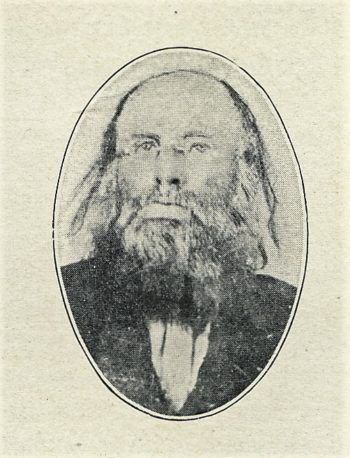
The only known photo of John Johns, as a delegate to the Republican National Convention held in Chicago in 1860.
By Al Nelson
John Johns permanently imprinted his name in Iowa frontier lore when he involved himself in the 1860 State Republican Convention to nominate their candidate for the presidency of the United States. It seems he was never appointed as a delegate from Webster County, nor was he invited to Des Moines for the event. Yet, he traveled downriver hoping to express his opinions on a larger platform than just stumping in Border Plains.
On Jan. 18, 1860, he caused quite an uproar in Sherman Hall at Third Street and Court Avenue. Johns arrived in the assembly room that was “full to overflowing” at the largest party convention ever held in the state up to that time. His “home-spun garb” caused quite a stir as it was in distinct contrast to the formal dress of other attendees. He wore “a knitted cap of blue and white yarn that ran up to a peak, whence a tassel flared and flirted jauntily with every motion of his head.” A hunting shirt and crude belt showed over his homemade reddish-brown suit. He presented a definite “backwoods” look to the rest of the assemblage. His thin gray hair, unkempt beard and weather-beaten appearance were witness to his 60 years.
During a lull period in the proceedings while the credentials committee was in prolonged discussions, a call came out for “Father Johns.” Johns did not hesitate as he sprang to the raised platform amid derisive laughter and general bedlam. The restless delegates were brought to order enough so that Johns could be heard and “proceeded without any embarrassment to elaborate on current topics.” He railed against men who feared the South would rebel if a “sectional ticket” were elected. Johns posed the question, “Who are these gentlemen who make these threats? Are they not the same men who a year ago went all over this state, raised their bandanas, and said they would support no man who did not carry the flag and keep step to the music of the Union?” In an oratorical crescendo he dared the South “to pluck a single star from the galaxy represented on the flag.” Johns “brought down the house.”
So impressed were the delegates that later in the evening they chose him as a delegate-at-large to represent them at the Republican National Convention to be held in Chicago, May 16-18, 1860. Johns accepted, saying that he would walk all the way to Chicago to cast his vote for William H. Seward.
TO READ MORE FASCINATING STORIES ABOUT IOWA HISTORY, subscribe to Iowa History Journal. You can also purchase back issues at the store.
